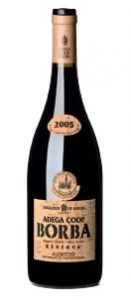Ficha Borba – teste


Fundada em 1955, a Adega Cooperativa de Borba foi a primeira de uma série de cooperativas constituídas no Alentejo. Hoje, fruto do seu esforço e investimento ao longo de 5 décadas, revela-se uma referência de índole nacional, sendo os seus vinhos reconhecidos como autênticos “embaixadores alentejanos”. Notavelmente no mercado português, mas também em mercados internacionais, os vinhos da Adega Coop. Borba são sinónimo de marcas de qualidade sólidas a preços adequados, o que gera uma verdadeira relação de lealdade e fidelidade com os consumidores. É o resultado de um trabalho de equipa consistente entre os objectivos delineados pela Direcção e abraçados pelos técnicos de viticultura, enologia, produção, assim como gestão, comerciais e marketing.

Fundada em 1955, a Adega Cooperativa de Borba foi a primeira de uma série de cooperativas constituídas no Alentejo. Hoje, fruto do seu esforço e investimento ao longo de 5 décadas, revela-se uma referência de índole nacional, sendo os seus vinhos reconhecidos como autênticos “embaixadores alentejanos”. Notavelmente no mercado português, mas também em mercados internacionais, os vinhos da Adega Coop. Borba são sinónimo de marcas de qualidade sólidas a preços adequados, o que gera uma verdadeira relação de lealdade e fidelidade com os consumidores. É o resultado de um trabalho de equipa consistente entre os objectivos delineados pela Direcção e abraçados pelos técnicos de viticultura, enologia, produção, assim como gestão, comerciais e marketing.

Fundada em 1955, a Adega Cooperativa de Borba foi a primeira de uma série de cooperativas constituídas no Alentejo. Hoje, fruto do seu esforço e investimento ao longo de 5 décadas, revela-se uma referência de índole nacional, sendo os seus vinhos reconhecidos como autênticos “embaixadores alentejanos”. Notavelmente no mercado português, mas também em mercados internacionais, os vinhos da Adega Coop. Borba são sinónimo de marcas de qualidade sólidas a preços adequados, o que gera uma verdadeira relação de lealdade e fidelidade com os consumidores. É o resultado de um trabalho de equipa consistente entre os objectivos delineados pela Direcção e abraçados pelos técnicos de viticultura, enologia, produção, assim como gestão, comerciais e marketing.

Fundada em 1955, a Adega Cooperativa de Borba foi a primeira de uma série de cooperativas constituídas no Alentejo. Hoje, fruto do seu esforço e investimento ao longo de 5 décadas, revela-se uma referência de índole nacional, sendo os seus vinhos reconhecidos como autênticos “embaixadores alentejanos”. Notavelmente no mercado português, mas também em mercados internacionais, os vinhos da Adega Coop. Borba são sinónimo de marcas de qualidade sólidas a preços adequados, o que gera uma verdadeira relação de lealdade e fidelidade com os consumidores. É o resultado de um trabalho de equipa consistente entre os objectivos delineados pela Direcção e abraçados pelos técnicos de viticultura, enologia, produção, assim como gestão, comerciais e marketing.
Adega Coop. Borba, C.R.L.
Largo Gago Coutinho e Sacadura Cabral, 25
Apartado 20
7151-913 Borba – Portugal
Tel: +351 268 891 660
Fax: +351 268 891 664
geral@adegaborba.pt
www.adegaborba.pt

![]()
Adega Cooperativa de Borba Reserva 2005
Nas melhores parcelas dos viticultores da Adega Coop. Borba é efectuada a recolha da matéria-prima para a obtenção deste verdadeiro ex-libris, o Reserva, conhecido por “rótulo de cortiça”. Na Adega, as uvas foram recepcionadas em pequenas caixas de transporte e seguiu-se o esmagamento suave das mesmas com desengace parcial. Iniciou-se a fermentação alcoólica com maceração prolongada de 10 a 15 dias, de maneira a extrair todas as subtilezas aromáticas e gustativas da uva. A fermentação maloláctica ocorreu em depósitos de inox. Para maior complexidade das suas características organolépticas, o vinho estagiou 12 meses em barricas de 2º e 3º ano, de carvalho francês, e em tonéis de madeira exótica, com envelhecimento posterior de 6 meses em garrafa na cave.
![]()
Adega Cooperativa de Borba Reserve 2005
The collection of the raw material for this real ex-libris, the Reserve, known for its “Rótulo de Cortiça” (Cork Label) is carried out in the best vineyard plots belonging to the Adega Coop. Borba. In the winery, grapes were received in small transport boxes and then gently crushed and partially de-stemmed. Then alcoholic fermentation was started with a long maceration for 10 to 15 days, so as to extract all the aromatic subtleties and full flavour from the grape. Malolactic fermentation took place in stainless steel vats. To enhance the complexity of its organoleptic characteristics, the wine was aged for 12 months in 2 and 3 year old French oak barrels and in exotic wood tonnes, with further ageing in the bottle in the cellar for 6 months.
![]()
Adega Cooperativa de Borba Reserve 2005
The collection of the raw material for this real ex-libris, the Reserve, known for its “Rótulo de Cortiça” (Cork Label) is carried out in the best vineyard plots belonging to the Adega Coop. Borba. In the winery, grapes were received in small transport boxes and then gently crushed and partially de-stemmed. Then alcoholic fermentation was started with a long maceration for 10 to 15 days, so as to extract all the aromatic subtleties and full flavour from the grape. Malolactic fermentation took place in stainless steel vats. To enhance the complexity of its organoleptic characteristics, the wine was aged for 12 months in 2 and 3 year old French oak barrels and in exotic wood tonnes, with further ageing in the bottle in the cellar for 6 months.
![]()
Adega Cooperativa de Borba Reserve 2005
The collection of the raw material for this real ex-libris, the Reserve, known for its “Rótulo de Cortiça” (Cork Label) is carried out in the best vineyard plots belonging to the Adega Coop. Borba. In the winery, grapes were received in small transport boxes and then gently crushed and partially de-stemmed. Then alcoholic fermentation was started with a long maceration for 10 to 15 days, so as to extract all the aromatic subtleties and full flavour from the grape. Malolactic fermentation took place in stainless steel vats. To enhance the complexity of its organoleptic characteristics, the wine was aged for 12 months in 2 and 3 year old French oak barrels and in exotic wood tonnes, with further ageing in the bottle in the cellar for 6 months.

![]()
Adega Cooperativa de Borba Reserva 2005
Nas melhores parcelas dos viticultores da Adega Coop. Borba é efectuada a recolha da matéria-prima para a obtenção deste verdadeiro ex-libris, o Reserva, conhecido por “rótulo de cortiça”. Na Adega, as uvas foram recepcionadas em pequenas caixas de transporte e seguiu-se o esmagamento suave das mesmas com desengace parcial. Iniciou-se a fermentação alcoólica com maceração prolongada de 10 a 15 dias, de maneira a extrair todas as subtilezas aromáticas e gustativas da uva. A fermentação maloláctica ocorreu em depósitos de inox. Para maior complexidade das suas características organolépticas, o vinho estagiou 12 meses em barricas de 2º e 3º ano, de carvalho francês, e em tonéis de madeira exótica, com envelhecimento posterior de 6 meses em garrafa na cave.
![]()
Adega Cooperativa de Borba Reserve 2005
The collection of the raw material for this real ex-libris, the Reserve, known for its “Rótulo de Cortiça” (Cork Label) is carried out in the best vineyard plots belonging to the Adega Coop. Borba. In the winery, grapes were received in small transport boxes and then gently crushed and partially de-stemmed. Then alcoholic fermentation was started with a long maceration for 10 to 15 days, so as to extract all the aromatic subtleties and full flavour from the grape. Malolactic fermentation took place in stainless steel vats. To enhance the complexity of its organoleptic characteristics, the wine was aged for 12 months in 2 and 3 year old French oak barrels and in exotic wood tonnes, with further ageing in the bottle in the cellar for 6 months.
![]()
Adega Cooperativa de Borba Reserve 2005
The collection of the raw material for this real ex-libris, the Reserve, known for its “Rótulo de Cortiça” (Cork Label) is carried out in the best vineyard plots belonging to the Adega Coop. Borba. In the winery, grapes were received in small transport boxes and then gently crushed and partially de-stemmed. Then alcoholic fermentation was started with a long maceration for 10 to 15 days, so as to extract all the aromatic subtleties and full flavour from the grape. Malolactic fermentation took place in stainless steel vats. To enhance the complexity of its organoleptic characteristics, the wine was aged for 12 months in 2 and 3 year old French oak barrels and in exotic wood tonnes, with further ageing in the bottle in the cellar for 6 months.
![]()
Adega Cooperativa de Borba Reserve 2005
The collection of the raw material for this real ex-libris, the Reserve, known for its “Rótulo de Cortiça” (Cork Label) is carried out in the best vineyard plots belonging to the Adega Coop. Borba. In the winery, grapes were received in small transport boxes and then gently crushed and partially de-stemmed. Then alcoholic fermentation was started with a long maceration for 10 to 15 days, so as to extract all the aromatic subtleties and full flavour from the grape. Malolactic fermentation took place in stainless steel vats. To enhance the complexity of its organoleptic characteristics, the wine was aged for 12 months in 2 and 3 year old French oak barrels and in exotic wood tonnes, with further ageing in the bottle in the cellar for 6 months.
